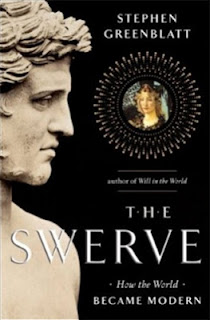 Poggio Bracciolini was not a fancy man. He was short in
stature with a middle-aged paunch. To the Germans he passed along his travels,
he must have looked strange. Germanic people were not used to his Italian tunics
and tights. His leather boots were a little too thin for the winter.
Poggio Bracciolini was not a fancy man. He was short in
stature with a middle-aged paunch. To the Germans he passed along his travels,
he must have looked strange. Germanic people were not used to his Italian tunics
and tights. His leather boots were a little too thin for the winter.
The year was 1417 and Poggio found himself to be unemployed
from his life’s work. He had slowly risen in the papal service of secretary to popes
by his clear penmanship. His technique of writing was considered a work of art.
The official title was “scriptor” of documents; although, his last post was the
stately position of Secretary to John XXIII.
With the title came the power of knowing and Poggio was
privy to secrets of which John XXIII had many. These secrets held even after
the pope’s name was stricken from all papal records. And, while Poggio toured
Southern Germany, his fallen master sat rotting in a Heidelberg prison.
A man with no family ties, Poggio now had the time to pursue
his new vocation. He was now acting as a book hunter. Not the fancy books you
might think either. He did not search for the painted chapters and jewel
encrusted tomes. Those books were all behind lock and key. He did not seek the
illustrated medical or celestial books of the day, but something less
desirable.
Poggio was on a quest to find ancient Latin text. His
inspiration came from 80 years earlier when an Italian found Livy’s “History of
Rome” and other forgotten greats such as Cicero and Propertius.
“The recovered text were copied, edited, commented upon, and
eagerly exchanged, conferring distinction on those who found them.” All this
discussion became the study of humanities and Poggio considered himself a
“humanist.”
That winter day in 1417, Poggio stopped in the once wealthy Abbey
of Fulda. His letters to friends did not mention this destination, but he would
have considered it a place to pick up a few bargains. What he found was a text
written in 50 BCE by the noted scholar Titus Lucretius Carus.
The finding of the book “On the Nature of Things” was to be
a miracle of which the author did not believe. “[Lucretius] thought that
nothing could violate the laws of nature. He posited instead what he called a
‘swerve’ [or] an unexpected, unpredictable movement of matter.”
Pick up this Pulitzer Prize winner, The Swerve by Stephen
Greenblatt. It is an unexpected joy to read.



2 comments:
Wow. This is one that I would probably have skipped over completely. It sounds terrific.
2 Kids and Tired Books
Holly, this book is a great read! I keep rereading parts to Hubby! :D
Post a Comment